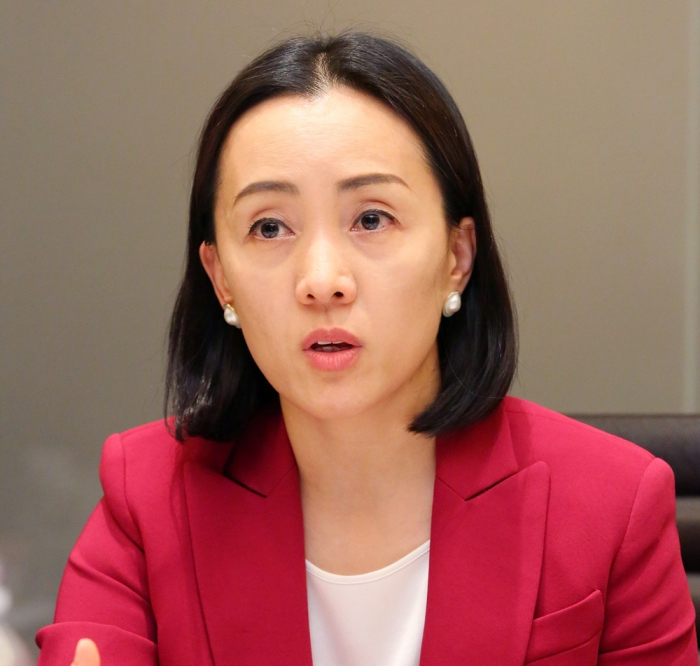CPPIB says no negative screening for ESG investing
Asia head Suyi Kim says ESG is not short-term investment theme
By May 27, 2021 (Gmt+09:00)
LG Chem to sell water filter business to Glenwood PE for $692 million


Kyobo Life poised to buy Japan’s SBI Group-owned savings bank


KT&G eyes overseas M&A after rejecting activist fund's offer


StockX in merger talks with Naver’s online reseller Kream


Mirae Asset to be named Korea Post’s core real estate fund operator



The Canada Pension Plan Investment Board (CPPIB) does not carry out negative screening to exclude companies and sectors that do not comply with environmental, social and governance (ESG) standards so that the pension scheme will not miss good investment opportunities, said its Asian operations head.
For ESG investing, the CPPIB, or CPP Investments, selects companies based on its analyses of the correlation between ESG factors and the company's financial results, as well as on the estimated risk-adjusted returns that factor in ESG matters.
Suyi Kim, the Canadian pension fund's senior managing director and Asia head, said in an online speech on May 26 that ESG is an investment trend unlikely to fade in the near term, although there may be no clear short-term correlation between ESG criteria and the companies' financial results.
"From a long-term perspective, environmentally unfriendly companies and those with weak corporate governance will unlikely survive," she said in the speech for the Institute for Global Economics, an independent Korean research organization.
Kim spoke on this topic: Perspectives on ESG investing from CPP Investments and prospects for international financial markets.
ESG investing is not an option but a necessity for pension funds, given their long-term investment horizon of as long as 100 years, she said.
Unlike a few other pension funds that have adopted negative screening on high-emitting companies and manufacturers of cigarettes and weapons of mass destruction, CPPIB only excludes from its portfolio companies related to cluster bombs and anti-personnel mines, in accordance to local laws banning investments in those sectors.
Her remarks come after South Korea's National Pension Service in April shelved a plan to introduce negative screening on coal mines and relevant businesses in an aim to build a low-carbon portfolio, as it failed to get the nod from its top decision-making body.
She stressed the importance of analyzing the risk and opportunity arising from each ESG factor by scenario. CPPIB has conducted empirical studies on the relationship between the ESG factors and the company's financial results since 2008, based on which it built its own database.
"Institutional investors need to exactly know how ESG factors affect the company's financial results," Kim noted.
In the decision-making process on a target company, CPPIB estimates its risk-adjusted returns based on all possible scenarios: in case the climate change impact worsens as expected, or in case the impact proves negligible.
For ESG-themed investments, CPPIB set up a team responsible for sustainable energy investing and had put $9 billion into the renewable energy sector, including carbon capture, battery, electric vehicle charging and energy infrastructure companies, over the past three years.
In 2018, it became the first public pension fund to issue a green bond used for eco-friendly investment purposes only.
Kim oversees CPPIB's Asian investments worth C$134 billion, about one-quarter of the pension scheme's total assets under management of C$500 billion ($412 billion). Over the past year, CPPIB delivers an average 10.8% return on investment.
Regarding post-pandemic investment, CPPIB has set its sights on industries related to recent lifestyle changes in China, India and emerging Asian countries.
"Emerging markets will account for 33% (of the CPPIB's AUM) by 2025 from the current 20%. e-health, education and fintech that support lifestyle changes will be our major investment targets," she said.
e-health is a recent practice offering contactless healthcare services.
Write to Jung-hwan Hwang at jung@hankyung.com
Yeonhee Kim edited this article.
-
 ESG investingNPS shelves plan for negative screening on high emitters
ESG investingNPS shelves plan for negative screening on high emittersApr 30, 2021 (Gmt+09:00)
4 Min read


